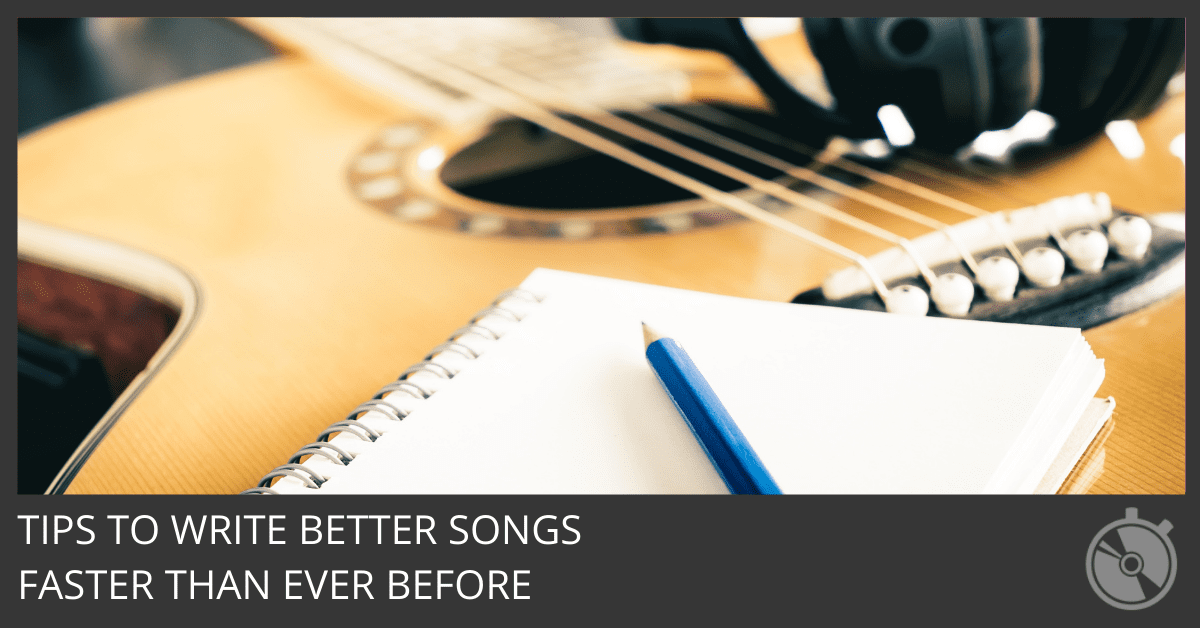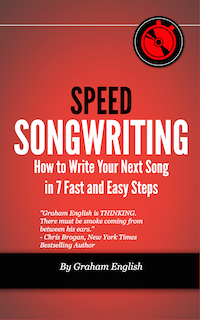
Most people think that writing a song is something that only gifted people can do. They believe that to be a successful songwriter, you need to be born with some kind of special talent. However, this isn’t true at all!
Anyone can write a song if they know how. And with the right tips and techniques, you can triple your success rate and write better songs faster than ever before. So if you’re interested in becoming a successful songwriter, follow these tips!
- When Brian Wilson struggled with his songwriting, among other things, he was rewarded with a cheeseburger for every song he wrote. If you’re eyeing a piece of equipment or a new studio toy, tell yourself that you’ll write five songs before you think about buying it. It will give you the work and satisfaction to finish a song, which in itself is a great reward. (Fair Warning: Speed Songwriters could end up eating several cheeseburgers a day!)
- In addition to songwriting, jam, sketch, noodle, and experiment as much as you can with your music and lyrics. Remember, if you experiment with writing songs in a new way, it will be worth it. It will add wrinkles to your brain. And the more you experiment, the more creativity will flow into new songs.
- Make sure you have some fun along the way and actually enjoy writing music and lyrics. If writing is nothing more than a chore for you, then stop until it’s fun again. The last thing you want to do is write a new song when it’s just something that *has* to be done!
- I’m sure you know this already, but if you’re a songwriter, you need to do it *every day. Spend an hour writing a song a day, and in one year, you’ll have 365 new songs that no one else has! (*Let’s be real...you need rest, too! But, a consistent routine is the only thing that works. A consistent songwriting routine is more important than the day-by-day results.)
- When you put the time into writing songs every day, it becomes a habit that is easy to keep up with because you will do it all without thinking. You won’t have to force yourself because when you decide you’re going to write a song, it’s going to happen!
- To write successfully, you should try everything at least once (unless someone you trust tells you otherwise). Everyone has their way of doing things, especially me. Some people like using software or hardware or even both. Others work exclusively on an acoustic guitar. Others still prefer only using lyrics and melodies (and maybe chords). Some like to change meters constantly. Anything goes. So try everything you can think of, especially things you wouldn’t have thought of before (like Speed Songwriting)!
- If none of your songs are coming out well for several days or weeks in a row, take some time off. It’s probably best to take a break and rest so that when you start writing again, the quality is better than before—Nah, just kidding. Keep writing, and you’ll break through the rut. My advice is to enjoy writing bad songs because they’re inevitable, and they can be FUN with the right attitude!
- Regarding writing music you hate, go down the rabbit hole and figure out what you hate, so you don’t do it again! Name it and tame it!
- You know how some days you just can’t get anything good to come out? Well, try to write anyway. Maybe not the same session as before but perhaps the next session or the next day. Don’t worry so much about being perfect on each try because perfection is overrated. Pause. Ask me how I don’t know. Pause for laughter. Just have fun writing songs and getting better in your own way!
- When you sit down to write a song and nothing comes out well, start with something random, like an odd chord progression or time signature, and try to fit lyrics and melodies in there somehow. Force ideas and figure out why they don’t work quickly. You’ll learn more than if you just abandoned an idea without reflecting on why you abandoned it. (No need to dwell on every bad idea, but along the way, get better at naming why an idea is bad.)
- This one is really simple - just throw away all your old songs! When you feel like writing something new, ignore what came before. Besides, there’s never a shortage of great things to write about! Many songwriters suffer from “idea scarcity.” Bit there’s no scarcity of ideas, so there’s no need to grip one song or idea so tightly. Make a creative decision and move on to the next step. You improve the quality of your work with more output, not less.
- Make sure that there is a balance between heavy words and light ones. Heavy words are great for creating atmosphere and uniqueness but leave room for lighter words that bring a break to what you just heard. Try to use lighter words when possible because too much heaviness makes it, well, too heavy! What’s a “heavy” or “light” word? Prepositions, articles, and conjunctions are light words. Nouns, verbs, and adjectives are heavy words (especially multi-syllable words.) Use your best judgment and create contrast in your words.
- I recommend brainstorming as often as you can because, after a while of doing it, more ideas for your songs will start popping up in your head all the time! All you need to do is sit down with a piece of paper and a pencil and start listing every idea that pops into your head - no matter how stupid or unrelated it might seem at first! And then use these ideas however you want! Always doodle in words (and doodle in doodles!).
- It’s always good to get feedback on your songs from someone who isn’t involved in their creation. They’ll give you an outsider’s point of view, which can help you realize any mistakes that might have been overlooked by all the people involved in creating them. I hate to be the one to give you this tip.
- This tip is also very important: never forget about other genres than the ones you like yourself! If you don’t like country music, for example, try listening to it to understand the idioms of the genre. You will probably end up writing better lyrics and music if you broaden your influences! (Remember what I said about figuring out what you hate: Name it and tame it!)
- Write songs that are easy to remember. There’s nothing more frustrating for a listener than forgetting the name of your song or band after hearing it once. Make catchy melodies and lyrics so they’ll be able to sing along with you. Most importantly, make sure your chorus is memorable!
- What do you want people to feel when they hear your song? Try writing about these feelings because this increases the chance of creating something that can stir up emotions in people. Your listeners want to be touched by your songs, not just hear them. So use specific words, and don’t forget to use lots of sensory detail in your lyrics!
- Tell a story in your lyrics that people can relate to or learn from. I don’t mean that you have to write the next great novel in three minutes, but try to give them something meaningful, something they’ll be able to take with them after the song is over. This makes it easier for them to connect with your music on a deeper level.
- Use rhyming patterns in everything you write! Make sure you stick to a rhyme scheme and adjust it for added effect. But don’t go overboard either because too much rhyming is just as bad as not enough of it! Make your rhyme choices personal because so much of your style is told in your rhymes.
- It’s good to find a balance between writing what you know and writing about things that seem interesting or exciting. Try to use lots of personal experience in your lyrics, but also try to write songs that will connect with people on the deepest level possible. Talk about emotions, actions, and how they make people feel - these are universal themes everyone can relate to!
- Choose words with care because even a slightly different word with a slightly different meaning changes the impact of the sentence entirely! I recommend using a rhyming dictionary, a dictionary, and a thesaurus from time to time, even if you’re not struggling with words. Be curious about words and languages.
- I try to write a song each day if possible, but this doesn’t mean I always succeed. Writing daily is aspirational. I take time off. Sometimes I have to take time off when I don’t want to. But you want to write more days than you don’t. The trick is having a routine that’s easy to stick to and something you look forward to so much that you would miss it if you couldn’t stick to it.
- Remember that the more you write, the easier it will be to write quality songs! It’s true what they say - writing is a skill developed with practice. If you don’t have any inspiration at first, just sit down and force yourself to create something - anything! Even something bad! Get that first draft done fast. You can always go back later and fix things up. Don’t waste time sitting there for hours trying to figure out one word or one note! Use a dummy lyric or a placeholder melody and move on to the next creative decision.
- Songwriting is like any other skill: the more you practice, the better you get. It might sound obvious, but many of us who struggle with songwriting would be surprised to find how far we’ve come if we started months or years ago.
Related Resources
And remember - even though I’ve given you 24 tips on how to triple your songwriting success rate, these only work if you actually put them into practice.
So what are you waiting for? Start writing those awesome songs now!
Need a hand? Just give me 15 minutes a day over the next four days! Watch the hour-long Speed Songwriting Video Guide and discover how to write your next song in 7 fast and easy steps!
I’ll help you keep writing songs over the next 8 weeks, no matter your schedule. How surprised will you be after 8 weeks of songwriting? Let’s find out: The Speed Songwriting Mastery Program

Enter your first name and email address below and click “GET ACCESS NOW!” to get the Speed Songwriting Cheat Sheet delivered to your inbox!
We guarantee 100% privacy. Your information will not be shared.

Leave a Reply